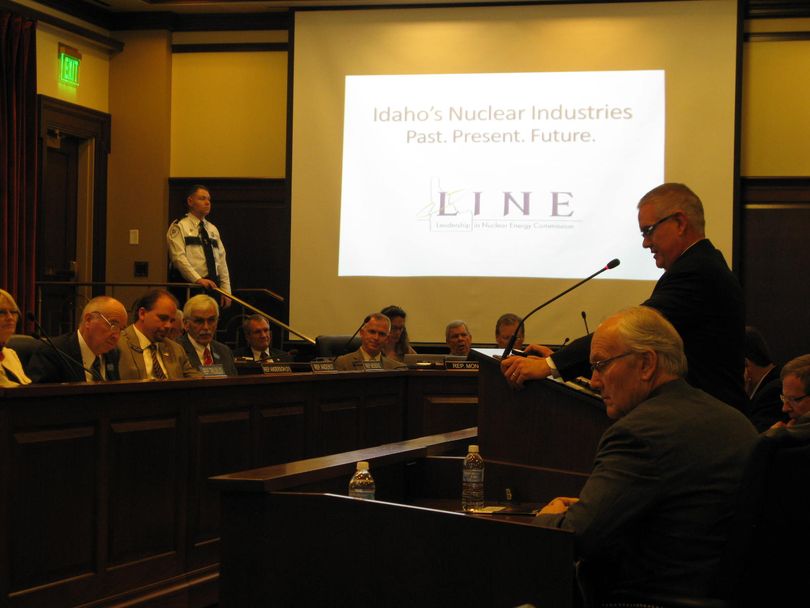Former Sen. Larry Craig: Nuke agreement, like Constitution, may need changes over time

Former U.S. Sen. Larry Craig is among those addressing lawmakers on the House Environment and Senate Resources committees in the Capitol Auditorium this afternoon, as part of a presentation on nuclear energy in Idaho, past and future. Craig offered “a bit of a historic perspective,” saying, “Gov. Andrus saw the problem and took action. Gov. Batt was elected, he was faced with a responsibility to deal with the issue that he was handed when he was elected governor. I was then the U.S. senator, I got a call from our governor saying, ‘Larry, what do we do?’ I assembled the DOE people and the governor and the attorney general came, and the discussion began that ultimately crafted the agreement, unique to all the states in the nation.”
Craig noted that the agreement, which is best known as the Batt Agreement or the nuclear waste settlement agreement, was endorsed by Idaho voters. “Those who embrace the agreement today, and that’s all of us, amongst them were once its enemies and its critics,” he said.
Still, he said, ”There may be some need for change in the future, depending on mission and dynamics and understanding.” Craig compared the waste agreement to the U.S. Constitution. “It’s been changed 27 times over 200 years to fit the changing needs of a changing nation,” he said. “We may want to do that with this agreement in the future to meet the mission of the laboratory.”
Gov. Butch Otter and state Commerce Director Jeff Sayer also are among those addressing lawmakers at this afternoon’s session; you can watch live here. Otter applauded the work of his Leadership in Nuclear Energy (LINE) Commission, in its newly issued review of the Idaho National Laboratory in eastern Idaho and nuclear-related activities in the state. “I concur wholeheartedly with the commission’s assessment that the Idaho National Laboratory is a significant state asset,” Otter said. “The state of Idaho should take immediate and long-term steps to enhance the future of the nation’s lead nuclear research and development laboratory that is responsible for over 24,000 jobs and has an annual economic impact on Idaho of more than $3.5 billion.” Click below for more from Otter in his full news release.
C.L. “Butch” Otter
GOVERNOR
NEWS RELEASE
FOR IMMEDIATE RELEASE:
LINE COMMISSION: IDAHO SHOULD EXERCISE LEADERSHIP IN PROTECTING THE INL AS A SIGNIFICANT STATE ASSET
(BOISE) – Governor C.L. “Butch” Otter today applauded the effort of his Leadership in Nuclear Energy (LINE) Commission in conducting an extensive review of the Idaho National Laboratory and nuclear-related activities in Idaho.
After nine public meetings, dozens of presentations and several hundred comments from the public, the LINE Commission’s final report was unveiled today at a special joint meeting of the Senate Resources and Environment and House Environment, Energy and Technology committees as part of the Idaho Council on Industry and the Environment’s “Gold Room Workshop” series.
“I concur wholeheartedly with the Commission’s assessment that the Idaho National Laboratory is a significant state asset,” Governor Otter said. “The State of Idaho should take immediate and long-term steps to enhance the future of the nation’s lead nuclear research and development laboratory that is responsible for over 24,000 jobs and has an annual economic impact on Idaho of more than $3.5 billion.”
One of the immediate action items recommended by the Commission is creation of a Nuclear Advisory Council that would ensure Idaho’s interests are protected and that the nation continues to benefit from Idaho’s 60-plus years of experience in nuclear energy, research, development, demonstration and deployment.
“Practically every segment of Idaho’s economy has a council or commission dedicated to enhancing opportunities within that sector,” said LINE Commission Chairman Jeff Sayer, director of the Idaho Department of Commerce.
“The Department of Environmental Quality and the INL Oversight Office deserve great accolades for successfully guiding the cleanup efforts at INL,” Sayer said. “With that success, we see equal value in establishing a council to advise the state on nuclear research and industry opportunities and help the public understand these complex and critical issues based on balanced and accurate information.”
The LINE Commission had significant discussions about Idaho’s landmark 1995 settlement agreement with the federal government on removing radioactive waste from the state. And while no immediate changes were recommended to the agreement, the Commission identified a number of provisions that warrant further consideration. The Commission identified potential areas of opportunity that could fundamentally advance the mission of the lab, but only if the state engages in discussions or considers possible changes to benefit Idaho.
Throughout its nearly yearlong public process, the LINE Commission heard several recurring themes that resulted in four significant findings in the report:
1.Safety and environmental protection are non-negotiable
2.Nuclear storage and disposal technologies have markedly improved
3.The decision on Yucca Mountain demands Idaho’s attention
4.A significant industrial opportunity exists in nuclear energy
Based on those findings, the Commission made six broad recommendations for the state to consider as it works to promote and enhance the INL’s mission:
·Continue to work cooperatively with the U.S. Department of Energy and other impacted states to address remaining environmental risks and continue cleanup at the INL site.
·Exercise leadership as the U.S. government formulates federal energy and nuclear waste management policies.
·Capitalize on Idaho’s nuclear technology competencies by supporting the growth of existing nuclear businesses, the corresponding infrastructure, and the attraction of new nuclear businesses.
·Invest in infrastructure to enable the INL and Idaho universities to successfully compete for U.S. and global research opportunities.
·Develop and promote the Center for Advanced Energy Studies as a regional, national and global resource for nuclear energy research.
·Strengthen and expand nuclear education and workforce training offerings.
Within those recommendations, 13 immediate actions were recommended in the Commission’s final report. An executive summary is posted online at http://gov.idaho.gov/pdf/
###
